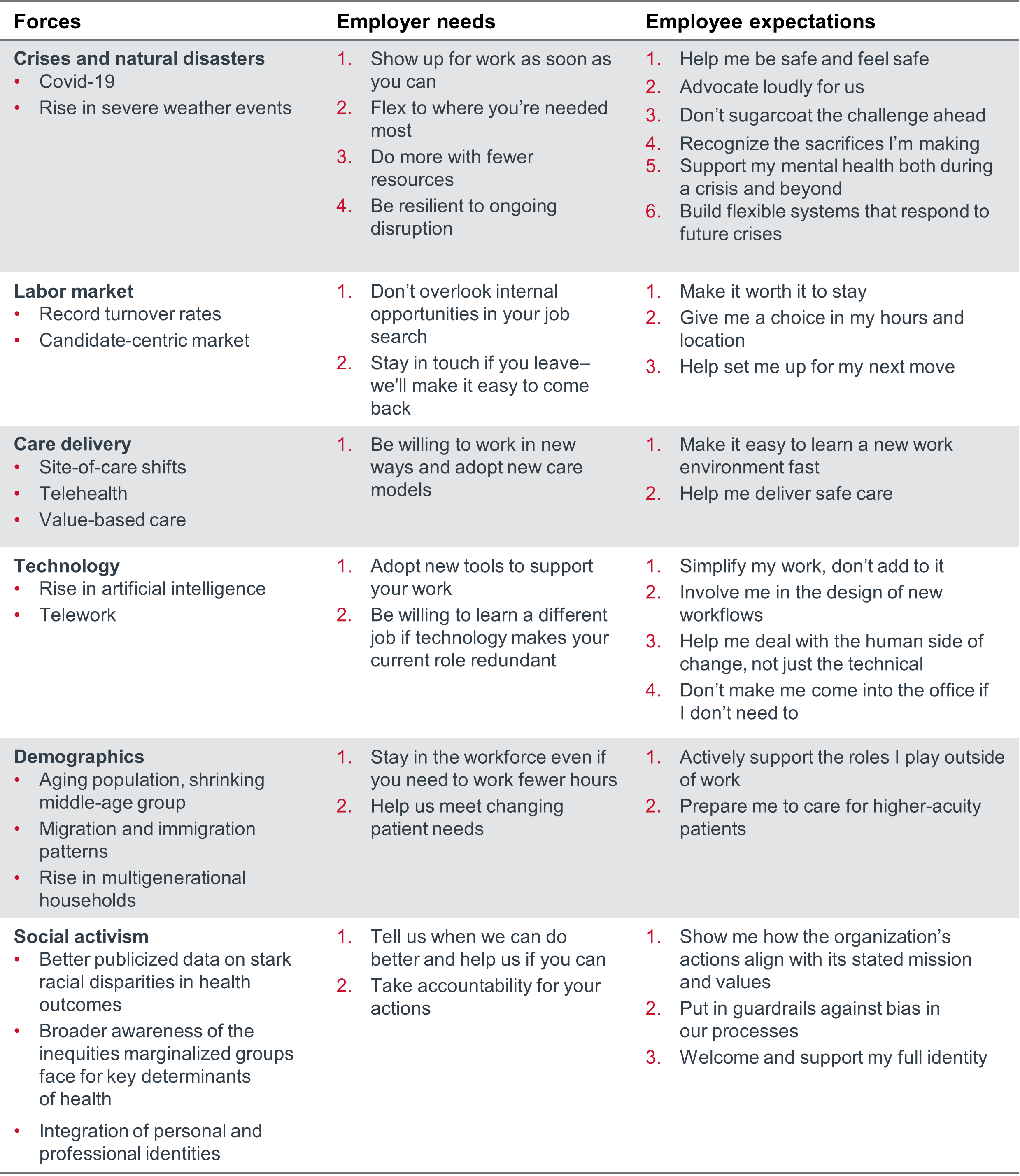Auto logout in seconds.
Continue LogoutA record 4.5 million Americans quit or changed jobs in November last year. Not surprisingly, health care continues to be among the top industries impacted by the "Great Resignation." The reality is: it's a candidate's market, and employees are going to go elsewhere if your organization is not meeting their expectations.
The pandemic has contributed to fast changes in employee expectations, but there is a myriad of other forces impacting what employees need from their employers—and vice versa. Take demographic shifts and our aging population as one example. The changing population structure will impact what the workforce needs from employers—as the percentage of Americans living in multigenerational households increases, staff will need more scheduling flexibility to support their roles outside of work, for example. And health care employers will need staff who can manage an aging population's more complex care needs.
Mar. 30: The evolving employer-employee compact
Evolving your employer-employee compact
These forces are all impacting the employer-employee compact—a set of guiding principles outlining the implied agreements, behaviors, and commitments between an employer and its employees. Some aspects of this compact are explicit (e.g., the job description, the paycheck) while others are implicit (e.g., a safe working environment, a role that's well respected in the community).
The table below summarizes how employee and employer expectations are evolving. This is not meant to be an exhaustive list, but a starting point to consider how these larger forces will continue to shift expectations across the coming years.

3 no-regrets moves to position your organization as an employer of choice
How can your organization best respond to these shifting employee expectations? Below, we've outlined three no-regret strategies that every organization should pursue if they want to effectively recruit and retain talent in today's competitive labor market. Use the audit questions at the end of each strategy to assess how well you're meeting employee expectations today.
1. Provide options for heightened flexibility
Flexibility is no longer a differentiator but a business imperative. Even before Covid-19, employees wanted greater flexibility in their work. A 2018 survey found that 50% of employees would leave their company if offered a more flexible alternative, and employees without access to flexibility are twice as likely to report being dissatisfied at work as compared to those who do. While health care has historically done a good job of providing flexible options to retain late career staff, this flexibility should extend to all roles, throughout the career lifecycle, and across key events.
While flexibility can be more difficult to offer in health care than in some industries, remember that flexibility can take a number of forms:
- Flexible job assignments: Option for staff to flex across roles and/or sites
- Reduced hours: Working less than 40 hours a week
- Schedule agility: Being able to step away from work for a couple hours to accommodate personal life
- Alternative scheduling: Being able to work unconventional hours, not on a traditional schedule
- Hybrid/remote work: Option to work away from the office full-time or part-time
- Benefit offerings: Childcare subsidies, onsite day care services, credits for cleaning, meal services, etc.
Quick employer audit to spot room to improve:
- Do all staff, regardless of role, have access to multiple options for flexibility?
- Do staff have access to additional flexibilities across key life events and throughout their career lifecycle?
- How can we simplify the administrative burden of these offerings for managers?
2. Support employees' holistic well-being
While most organizations have taken steps to better support their employees' well-being needs (both before and during the pandemic), there is still a large disconnect between employers and employees in terms of what constitutes adequate support. For example, a McKinsey report found that 71% of employers with frontline staff reported supporting their staff's mental health "well" or "very well," while only 27% of frontline employees agreed.
What is clear is that solely having emotional support resources available is not enough to meet the needs of your employees. Although stigma surrounding mental health has decreased during the pandemic, it continues to be a significant barrier preventing employees from utilizing support. The longstanding "I'm fine" culture within health care makes this particularly challenging.
Organizations need to not only provide comprehensive emotional support resources, but intentionally create a culture that allows employees to feel empowered to utilize the resources available. To learn more about breaking down this "I'm fine" culture, check out three strategies to build baseline emotional support or access the accompanying resource library for ideas to get started.
Quick employer audit to spot room to improve:
- If you picked five frontline team members at random, would they know how to access emotional support resources?
- Has your leadership team talked about how to access emotional support resources and/or their own experience using these resources?
- Have you made certain emotional support resources opt-out following a traumatic event or during times of routine high stress?
3. Embed diversity, equity, and inclusion in workforce strategy
While many organizations are dedicating resources towards improving diversity, equity, and inclusion (DEI), there is still a large gap to delivering on employee expectations. According to a 2019 study published by Coqual, 60% of employees think their company's D&I efforts are ineffective. Part of the problem is that the DEI function itself is often not set up to advance true structural change. This is the result of a number of factors, including lack of access to data, a disconnect with business strategy, a lack of accountability for outcomes, and unrealistic expectations.
To make meaningful progress, DEI needs to be everyone's job. Organizations should embed equity considerations into existing strategies across all departments, with all leaders taking responsibility for executing these imperatives.
The goal is to move from having equity-focused goals for the organization to creating real accountability for all leaders—not just those who have DEI in their job titles. A good starting place is to examine and modify existing talent management policies and process that have contributed to unequal outcomes and experiences in your own workforce.
Quick employer audit to spot room to improve:
- Do executive leaders have a shared DEI goal on their incentive plan?
- Do you hold all leaders (down to frontline managers) accountable for DEI goals?
- Have you analyzed your workforce data to uncover disparities across talent management processes (e.g., recruitment, hiring, performance management, total rewards, etc.)?
To learn more about the evolving state of what health care employees expect from their employer, join our upcoming webinar on March 30 and access our supporting resources below.
Wednesday, March 30 | 10 a.m. ET
![]() Join us for a webinar to explore the evolving state of what health care employees expect from their employer, and vice versa, across the coming decade. We will discuss the forces that are shaping these rapidly evolving expectations and how organizations can respond to position themselves as an employer of choice for 2031.
Join us for a webinar to explore the evolving state of what health care employees expect from their employer, and vice versa, across the coming decade. We will discuss the forces that are shaping these rapidly evolving expectations and how organizations can respond to position themselves as an employer of choice for 2031.
In this session, attendees will:
- Understand the forces that are driving shifts in employee expectations across the next decade
- Learn strategies to align workforce strategy to balance the needs of employers and employees
- Have the chance to share their perspectives via live polling and Q&A
 Provide options for heightened flexibility
Provide options for heightened flexibility
- Support employees' holistic well-being
- How to provide emotional supports for your workforce (advisory.com)
- Three strategies to build baseline emotional support (advisory.com)
- The Mandate for Workforce Recovery (advisory.com)
- How Parkview created a holistic response team to improve workforce well-being
- Behind brave faces: What support leaders need from their organization in 2021
- Embed diversity, equity, and inclusion in workforce strategy
- The manager's guide to inclusion and belonging: Tools to navigate specific leadership challenges using inclusive leadership (advisory.com)
- How to instill accountability for equity goals across your leadership team
- How to embed equity considerations into existing strategic priorities
- How to embed diversity and inclusion in your workforce strategy
- How Mercy Health reduced the impact of bias in the hiring process (advisory.com)
Don't miss out on the latest Advisory Board insights
Create your free account to access 1 resource, including the latest research and webinars.
Want access without creating an account?
You have 1 free members-only resource remaining this month.
1 free members-only resources remaining
1 free members-only resources remaining
You've reached your limit of free insights
Become a member to access all of Advisory Board's resources, events, and experts
Never miss out on the latest innovative health care content tailored to you.
Benefits include:
You've reached your limit of free insights
Become a member to access all of Advisory Board's resources, events, and experts
Never miss out on the latest innovative health care content tailored to you.
Benefits include:
This content is available through your Curated Research partnership with Advisory Board. Click on ‘view this resource’ to read the full piece.
Email ask@advisory.com to learn more.
Click on ‘Become a Member’ to learn about the benefits of a Full-Access partnership with Advisory Board
Never miss out on the latest innovative health care content tailored to you.
Benefits Include :
This is for members only. Learn more.
Become a member to access all of Advisory Board's resources, events, and experts
Never miss out on the latest innovative health care content tailored to you.


